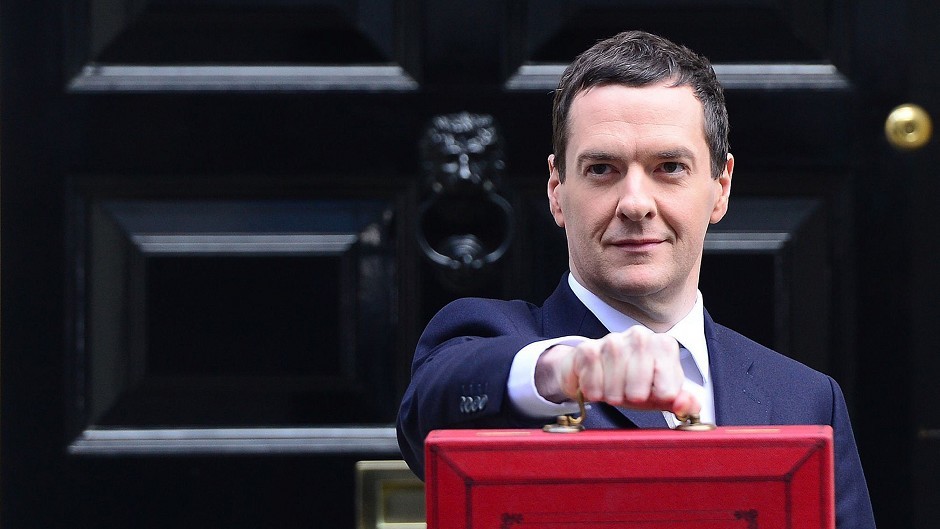The Chancellor declared the “age of irresponsibility” over yesterday as he announced plans to slash welfare and force employers to give staff a “pay rise” in the first Tory Budget for almost 20 years.
George Osborne immediately came under fire from Labour, the SNP and the Liberal Democrats as he outlined £12billion in welfare savings alongside the introduction of a new national living wage.
Unlike the March Budget, which featured a raft of measures targeted at the north and north-east – including commitments on City Deals for Inverness and Aberdeen, action on electricity prices and whisky duty cuts – there was little new on the table for the region yesterday.
However, the Chancellor confirmed the major tax cuts to North Sea oil and gas previously outlined would go ahead and said fuel duty would remain frozen this year.
After repeated calls from Tory backbenches, he also finally committed to meet the Nato pledge to spend 2% of national income on defence every year until the end of the Parliament.
The welfare cuts include a freeze on working-age benefits, tax credits and local housing allowances for four years from 2016-17.
In addition, support provided through tax credits and Universal Credit will be limited to two children and the benefit cap reduced to £20,000 per household.
It will apply in Scotland, but the Smith Commission Agreement means the Treasury will not count any top-up benefits introduced by Holyrood.
Mr Osborne’s plans also spell the end of the automatic housing benefit entitlement for out-of-work 18-21 year olds and will require those on higher incomes living in social housing to pay rents at the market rate.
The new national living wage, which a Treasury source said had been under consideration since 2013, will have to be paid by all businesses to employees over the age of 25.
Starting at a rate of £7.20 from next April – a rise of 70p on the current minimum wage but 65p less than the level set by the Living Wage Foundation – it will increase to £9 an hour by 2020.
The Chancellor said: “It can’t be right that we go on asking taxpayers to subsidise, through the tax credit system, the businesses who pay the lowest wages.
“Let me be clear – Britain deserves a pay rise and Britain is getting a pay rise.
“Britain has turned a corner and left the age of irresponsibility behind. Having come this far, there can be no turning back.”
According to the Government, 2.3 million people in the UK will get a direct pay rise, but shadow chancellor Chris Leslie warned the “real” living wage – as designated by the foundation – would have to go up to compensate for the cuts to tax credits.
As a result of the Government’s plan, the Office for Budget Responsibility (OBR) forecasts that the public finances will return to surplus in 2019/20.
Mr Osborne, who published a new fiscal charter alongside the Budget, said he aimed to establish a principle that – in normal economic times – governments should run an overall surplus to prepare “for whatever storms lie ahead”.
The charter commits the UK to keep debt falling as a share of GDP each year. Only when the OBR judges there is real GDP growth of less than 1% a year – measured on a rolling four-quarter basis – will a surplus no longer be required, Mr Osborne said.
To get there, the Chancellor told MPs he intends to keep cutting the deficit at the same pace as in the last Parliament.
Confirming the overall impact of the Budget north of the border, the Scotland Office said the Scottish Government would have £7million added to allocations in this financial year under the Barnett Formula.
Other measures announced yesterday include the abolition of permanent non-domicile tax status, the raising of the personal tax free allowance to £11,000 in 2016-17, as well as an increase in the higher rate threshold to £43,000 in the next financial year.
The Government estimates that by 2016/17, 2.5 million people in Scotland will see an average real terms gain of £84 and a further 47,000 individuals will have been removed from income tax altogether, compared to this financial year.
The Budget also brings in the Tory manifesto pledges on inheritance tax and childcare as well as an apprenticeship levy on all large firms, a gradual reduction to the bank levy rate alongside the introduction of a new 8% surcharge on bank profits from January and a cut in corporation tax to 19% from 2017-18 and 18% from 2020-21.
On public sector pay, the Chancellor said wage rises would be capped at 1% annually for the next four years following similar restraint in recent times.
This means they will not keep pace with inflation which the OBR anticipates will rise relatively sharply at the end of this year and the start of next as the recent falls in energy prices drop out of the calculation.
